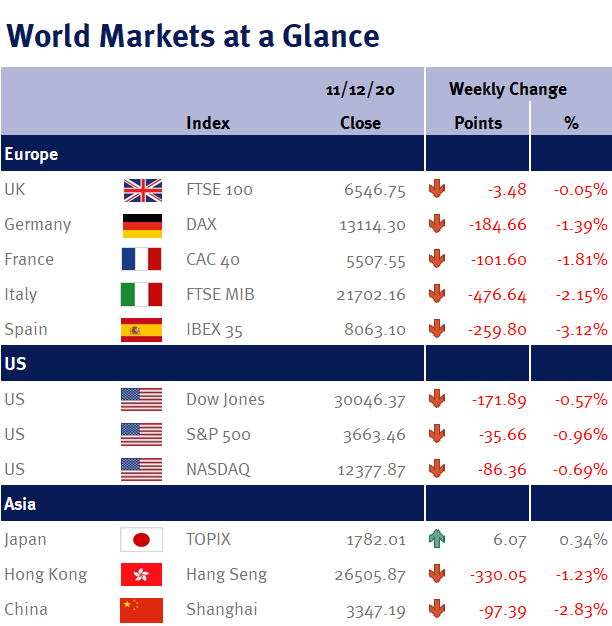This would typically be, ’the most wonderful time of the year’, as we reach the end of the year and people wind down for the holidays. However, 2020 has certainly been a year like no other and, it’s been an exceptionally busy week, especially for regulators and policy makers who continue to scramble in order to have agreements in place before the end of the year! Global Equity markets held up for most of the week, but with no breakthroughs on a new US fiscal stimulus package or post-Brexit trade relations, they closed the week broadly lower.
Week ending 11th December 2020.
14th December 2020

Whilst there were no breakthroughs, there was a lot of progress; US Treasury Secretary, Steve Mnuchin, presented a new $916bn US stimulus proposal after a month-long stalemate. Whilst his proposal received a somewhat frosty reception, a more favourable $908bn bipartisan proposal has been gaining traction, and is likely to be finalised and presented in the coming days.
With coronavirus cases rising in the US, and protracted stimulus talks, equity markets have been understandably volatile. However, it was encouraging that an advisory panel gave the Pfizer vaccine its approval, making it increasing likely US regulators will approve the vaccine for emergency use in the coming days.
The rollout of the Pfizer vaccine began in the UK this week, and whilst it garnered much media attention, it had little influence on equity markets. Instead it was Brexit trade talks which led to volatility in Sterling and UK equity markets. After Boris Johnson’s meeting with European Commission President, Ursula von der Leyen, failed to deliver a breakthrough, the rhetoric from both leaders toward the end of the week was increasingly warning of a no-deal Brexit. Whilst both leaders gave a new weekend deadline, trade talks are unlikely to ever be fully abandoned, and the heightened rhetoric is needed in order to maintain momentum ahead of the year-end deadline.
In Europe this week, the Central Bank increased its economic monetary support by extending and expanding its bond buying programme. However, the announcement was accompanied by comments from the ECB President, Christine Lagarde, that the facilities “need not be used in full”, “if favorable financing conditions can be maintained”. Christine Lagarde has long advocated that fiscal policy needs to be at the forefront of Europe’s economic policy and her restrained comments coupled with news that EU leaders had finally reached an agreement on a €1.8tn budget and post-pandemic recovery package, helped lift the Euro.
This coming week, government policy will continue to dominate headlines and there are scheduled monetary policy updates from the US the UK and Japan. We are also likely to see more vaccine approvals, and whilst this is extremely encouraging, vaccinating the global population is going to take time so consequently, equity market volatility is likely to remain elevated in the short term.
Many equity markets have staged remarkable recoveries this year, but there are still many companies in sectors where demand for their products and services remains significantly depressed. However, the Pfizer vaccine is the first of many and we therefore remain confident the coronavirus is a transient issue and we will see a rebound in demand, which bolsters the outlook for 2021.
Peter Quayle, Fund Manager
The latest market updates are brought to you by Investment Managers & Analysts at Wealth at Work Limited which is a member of the Wealth at Work group of companies.
Links to websites external to those of Wealth at Work Limited (also referred to here as 'we', 'us', 'our' 'ours') will usually contain some content that is not written by us and over which we have no authority and which we do not endorse. Any hyperlinks or references to third party websites are provided for your convenience only. Therefore please be aware that we do not accept responsibility for the content of any third party site(s) except content that is specifically attributed to us or our employees and where we are the authors of such content. Further, we accept no responsibility for any malicious codes (or their consequences) of external sites. Nor do we endorse any organisation or publication to which we link and make no representations about them.

